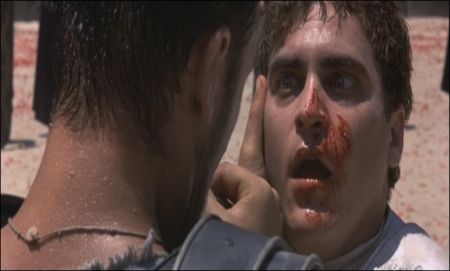Robert Hughes on Rome
 I don't want to be picky but I have not had a good afternoon.
I don't want to be picky but I have not had a good afternoon.
A new history of Rome by the Australian historian and critic, Robert Hughes, has arrived.
Doubtless it will be widely reviewed. This morning The Sunday Times, here in London, hailed it as 'superb'.
The author 'couldn't have chosen a better subject for himself'', I read.
So two hours ago I settled down to enjoy the 'feast'.
I have bad reading habits sometimes. I browsed before I began.
And on the last page of Chapter Two, I read about the death of the Emperor Augustus and how 'smoothly' went the transition of power to his successor, 'Livia's eldest son by him, Tiberius'.
Peculiar?
If Tiberius had been Livia's son by Augustus, the succession might well have gone smoothly (or not) but Tiberius was Livia's son by her first husband Tiberius Claudius Nero, an interesting character who lost his wife to the most powerful man of his age but ended up siring a vast dynasty of imperial potentates.
An easy mistake? Well, quite easy, I suppose, unless you are writing a history of Rome (and have forgotten Robert Graves and all the soap-opera versions too). Augustus sired only one child, a daughter, a matter often considered of some historical and dramatic note.
Two pages further on there is another death, that of the African king, Jugurtha, 'of starvation in 105 CE'. Which would be a fine addition to a section on the Emperor Caligula's prison policy if Jugurtha had not died more than 200 years before.
OK. That's the old BC/AD confusion. Easily done. So easily that it's done in the next line too. Vercingetorix , 'Caesar's chief enemy in Gaul' , is executed in '46 CE', ninety years after Caesar himself was killed.
I have some personal interest in gladiatorial games. But I can still be surprised by a declaration that 'a succession of autocrats, starting with Augustus himself and continuing onwards through Pompey and Julius Caesar, treated them as the greatest imperial show of all'.
Onwards? This is the 'Times Arrow' school of history where forward is forever back.
And then two pages later we have reached the gladiator emperor, Commodus, not an obscure modern figure (above) following his role in the film, Gladiator, starring that Australian icon, Russell Crowe . In 138 CE Commodus was the 'son and successor' of the Emperor Hadrian, Hughes writes, which is odd when Commodus's father, as shown in the film and in all other history books, was the philosopher emperor, Marcus Aurelius whom Commodus succeeded some forty years after the date given here.
So after 24 pages I have now stopped reading this book.
The wise advice to myself might be to skip all the chapters before the Renaissance and to see what Hughes has to say about the Trevi Fountain. The excellent Jonathan Keates, I discover, has done that already.
But I can still wonder why someone wants to write ancient history when he has such a strange lack of concern for what is known about it.
I can wait to be accused of pedantry. We are used to that at the TLS. But these are not errors about the obscure; they are mistakes about some of the best known episodes and characters in the ancient history of Rome.
Once upon a time - not so very long ago - an editor at Weidenfeld & Nicolson would have quietly corrected the errors of a best-selling star; or the text might have been shown to someone who had read some schoolbooks or watched some late night TV.
But that sort of nostalgia is useless. Perhaps next week I will start again at the beginning - and hope pages 102-126 were just a bad patch.
Peter Stothard's Blog
- Peter Stothard's profile
- 30 followers



